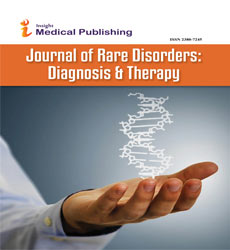Burkitt Lymphoma
Managing Editor, Journal of Rare Disorders: Diagnosis & Therapy, United Kingdom, E-mail: raredisorders@medicineinsights.com
Editorial
Burkitt lymphoma is a rare and aggressive form of lymphoma that affects the B-lymphocytes. When a lymphocyte (a type of white blood cell) grows out of control, lymphomas can develop. Lymphomas are categorized in two main groups: Hodgkin lymphomas and non-Hodgkin lymphomas (NHL). Burkitt lymphoma can be defined as a very fast-growing type of high-grade NHL. It develops from abnormal B lymphocytes (B cells).
There are three recognized forms of BL: Endemic (African): the most common form, Sporadic: a rarer form, Immunodeficiency-associated: occurs primarily in people with HIV infection. Burkitt lymphoma is characterized by the translocation and deregulation of the c-myc gene on chromosome 8. It accounts for only 1% of adult lymphoma, but up to 30% of childhood non-Hodgkin lymphomas. The symptom includes: Painless swellings, abnormality of bone marrow cell morphology, hyperuricemia, increased lactate dehydrogenase level; neoplasm of the oral cavity, night sweats, causes lots of lymph nodes to enlarge in many different parts of the body, and often involves your abdomen (tummy) and bowel.
It can be diagnosed by lymph node biopsy and with other tests. Tests are also needed to find out which parts of your body are affected by lymphoma – this is called ‘staging’, these test includes: a physical examination, blood tests to look at your general health, including your blood cell counts, a scan usually a combined PET/CT scan, bone marrow testsa lumbar puncture to check if the lymphoma has spread to your CNS.
The goal of treatment for Burkitt lymphoma might be to cure the lymphoma, control symptoms, control the lymphoma for as long as possible, stop lymphoma spreading to other parts of the body, such as the fluid around the brain and spinal cord and stop lymphoma coming back. Treatment recommended for Burkitt lymphoma is Chemotherapy with the antibody treatment rituximab. Some patient might also have surgery to remove large tumours. In chemotherapy, a regimen (combination of drugs) is used is given in cycles with drugs given on certain days followed by a rest period before the next cycle begins. All treatment has a risk of side effects.
You have a scan at the end of treatment to see how you have responded and you have regular follow-up appointments.
References
- https://www.healthline.com/health/burkitts-lymphoma#symptoms
- https://lymphoma-action.org.uk/types-lymphoma-non-hodgkin-lymphoma/burkitt-lymphoma
- https://www.leukaemia.org.au/blood-cancer-information/types-of-blood-cancer/lymphoma/non-hodgkin-lymphoma/burkitts-lymphoma/
- https://www.cancerresearchuk.org/about-cancer/non-hodgkin-lymphoma/types/burkitt-lymphoma
- https://rarediseases.info.nih.gov/diseases/5973/burkitt-lymphoma
- https://emedicine.medscape.com/article/1447602-overview
Open Access Journals
- Aquaculture & Veterinary Science
- Chemistry & Chemical Sciences
- Clinical Sciences
- Engineering
- General Science
- Genetics & Molecular Biology
- Health Care & Nursing
- Immunology & Microbiology
- Materials Science
- Mathematics & Physics
- Medical Sciences
- Neurology & Psychiatry
- Oncology & Cancer Science
- Pharmaceutical Sciences
